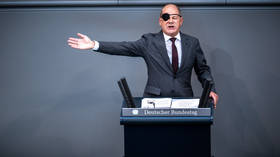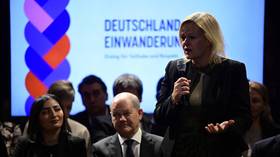Germany needs more immigrants – chancellor

Germany urgently needs to accelerate the inflow of skilled workers from outside the EU, Chancellor Olaf Scholz told fellow lawmakers on Wednesday. The EU’s biggest economy cannot survive without a steady inflow of foreign workforce, he insisted, while presenting a complex nationwide “modernization” program dubbed “the Germany Pact.”
Anyone who “claims that we can get by completely without workers from abroad” has never talked to a medium-sized company owner or to a hospital operator, Scholz said during his speech, adding that some 13 million workers in Germany would retire “by the middle of the next decade.”
The chancellor then called on federal and regional authorities to reduce the bureaucratic hurdles for the would-be new arrivals. “Everyone,” he urged, should be sticking to a recently adopted law on skilled workforce immigration “so that… nurses from Georgia and IT specialists from India do not have to wait months for a visa or a work permit.”
Scholz also told the lawmakers that his government has made some “important progress” in combating illegal immigration.
The chancellor’s “Germany Pact” is designed as a massive modernization project, described by Scholz as a “nationwide effort” to bring the economy back on track. The comprehensive package includes measures ranging from large-scale digitalization of various public-administration procedures and a reduction of bureaucratic burdens on the economy, to securing “clean, safe and affordable” energy and expanding housing construction.
Commenting on Scholz’s proposals, Germany’s opposition leader insisted that measures should be taken to make job income more attractive than welfare payments and to create incentives for older employees to keep their jobs for a longer period of time.
“We, the opposition, are of course willing to participate in reasonable proposals,” said Friedrich Merz, the leader of the Christian Democratic Union (CDU) – a part of the conservative bloc in the parliament, which forms the biggest opposition force. He still maintained that “illegal immigration” should be treated as the biggest problem on the agenda, adding that it should be addressed first.
Merz also accused Scholz’s government of a “paternalizing, paternalistic” view of the state’s role in the economy, adding that Germany had already been “suffocating in bureaucracy.”
According to Germany’s state statistics agency, net immigration into the country accounted for almost 1.5 million people in 2022. A total of 2.7 million persons arrived in Germany last year, including 1.1 million from Ukraine alone, its data shows. The nation is host to a total of 13.4 million foreigners and almost 24 million people out of its 83.2 million population have an immigration background, the agency said.
A poll conducted in May showed that the majority of Germans want stricter immigration policies and asylum procedures. Around a half of German citizens also want their nation to take in fewer refugees than it accepts now. The survey suggested that 54% of Germans believe that the disadvantages of immigration outweigh its benefits and that only 33% believe the opposite is true.














